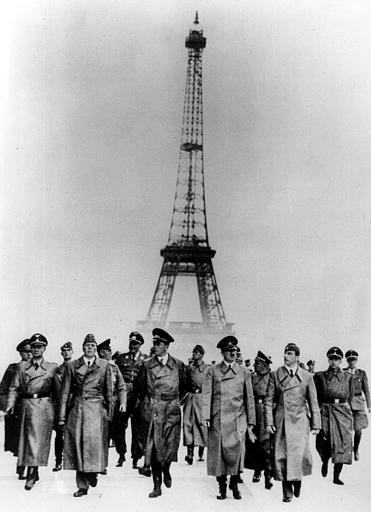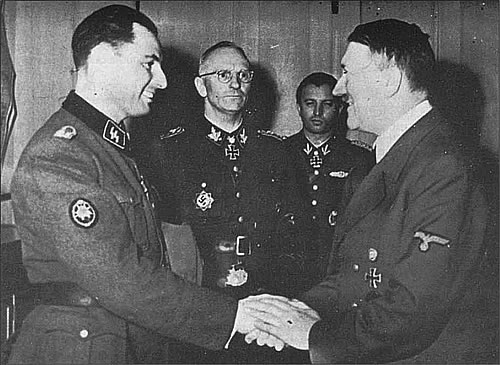
Volksführer Léon Degrelle
Hitler, Born at Versailles
1987
 Introduction
Introduction
For most Americans the globe-girdling catastrophe that we call the Second World War is now a matter neither of personal experience nor of memory, but of wood pulp and celluloid, books and films. Larger still is the majority for whom the cataclysmic FirstWorldWar - once spoken of as "The GreatWar" - is ancient history, an antic prelude to what those who participated in it sometimes like to call "The Big One." For most of us, perhaps, the two wars compare as do contrasting movies from the two eras. Our image of the First World War is brief, grainy, silent, with black-and-white, herky-jerky doughboys "going over the top"; we picture the Second as panoramic, technicolor, reverberating with stereophonic sound and fury, armadas of ships and planes and tanks sweeping forward to destiny.
A further disparity may be found in the popular historical and political assessment, such as it is, of the two wars. The majority of Americans doubtless still believes that the key to the Second World War is a simple one: a.demonic megalomaniac, Adolf Hitler, rose up to lead Germany to world domination and instead led his people to well-deserved ruin. Yet the view of the First World War held by the Americans of today, it is safe to say, is rather more tepid than the white-hot feelings of many of their grandparents in 1917, when "100- per-cent Americans" agitated to "Hang the Kaiser!" and mobs sacked German newspaper offices and presses in the worst outbreak of ethnic bigotry in our country’s history. For the contemporary generation the origins and course of the First World War are murky and obscure. Even the terrible hecatombs of the Western Front have faded into oblivion, and Kaiser Bill and his spike-helmeted Huns have long since been superseded by the Fuehrer and his goose-stepping myrmidons.
The evident lack of interest of even the literate American public in their country’s first “famous victory” of this century has been mirrored to a certain extent by the professional historians of the Left-Liberal Establishment, which of course holds sway in the colleges and universities of not only American but the entire Western world. The professors have their reasons, however. The more competent among them are aware that shortly after the First World War, in a signal achievement of historical scholarship, Revisionist writers in this country and in Europe unmasked the mendacious propaganda disseminated by the British, French, Tsarist Russian, and American governments.
Professors such as Sidney Bradshaw Fay, Max Montgelas, Georges Demartial, and the incomparable Harry Elmer Barnes overthrew the historiographical and moral underpinnings of the verdict expressed in Article 231 of the onerous Treaty of Versailles, that Germany and her allies had imposed an aggressive war on the Triple Entente and thus bore all responsibility for the calamity. The Englishman Arthur Ponsonby demonstrated just as convincingly that the atrocity charges against the Germans, including such canards as a "cadaver factory" for soap and the like from the corpses of fallen German soldiers, were manufactured and spread by teams of talented fabricators, not a few of them, like Arnold Toynbee, reputable men of scholarship ostensibly dedicated to the search for truth.
The modern school of historical obfuscators, propagandists more than scholars, and thus cognizant of the need for a consistent pattern of German “guilt” and “aggression” throughout this century, long ago undertook to roll back and suppress the achievements of Revisionist scholarship on the origins of the First World War. Inspired by the German renegade Fritz Fischer, whose Griff nach der Weltmacht (Germany’s Bid for World Power, 1961), they hailed with hysterical relief, they have dismissed with sovereign disdain the notion that powers such as France, the British Empire, Tsarist Russia, or Serbia might have been motivated by aggressive designs. The professors have employed a second sleight-of-hand trick against Revisionist findings. It has been their tactic to separate quite artificially the origins and course of the war from its result, the Paris peace treaties, above all that of Versailles, and from the ineluctable consequences which flowed from that result. For them, and for their public of university students and educated laymen, Versailles was an entirely justified consequence of the war, and Adolf Hitler sprang up either as a manifestation of the German nation’s twisted “id” (Freud and his numerous epigoni and camp followers) or the puppet of the “Ruhr barons” (the Marxists), propelled along his way by something these professors are always careful to refer to as the “stab-in-the-back legend.”
Our leftist educators have also been adept at evading an honest evaluation of the Red terror which swept across Central and Eastern Europe in the wake of the German collapse, although they have wept copious tears behind their pink spectacles over the crushing of Communist juntas in Bavaria, Berlin, and Budapest. The deliberate failure of the professors to make sense of the cataclysmic events of 1914-1920 in Europe has now been redressed, however, by a man of both learning and action, a confidante of statesmen and a worthy comrade of heroes: the Belgian exile Léon Degrelle.
Léon Degrelle, who was born in 1906 in the sleepy little town of Bouillon, now a backwater in Belgium’s Luxembourg province, but once the seat of Godefroy de Bouillon, first Crusader king of Jerusalem, speaks in a voice few Americans will be familiar with. French-speaking, Catholic, European with a continental, not an insular, perspective, the man who nearly overturned his country’s corrupt power elite in the 1930’s thinks in a perspective alien to our (comparatively recent) intellectual heritage of pragmatism, positivism, and unbounded faith in the inevitability of "progress." Before all a man of action, Degrelle is in a tradition of vitalism, combining an inborn elan and chivalry with a hard-eyed, instinctual grasp of the calculus that determines politics - activity in relation to power - today foreign, for the most part, to the "Anglo-Saxon" nations.
It was precisely Degrelle’s will to heroic action in the defense of Europe and its values that led him to raise a volunteer force of his French-speaking countrymen, many of them followers of his pre-war Rexist political movement, and to ally with his country’s conqueror, Adolf Hitler, in a European crusade against Communism and Communism’s citadel, the Soviet Union. Degrelle, who has matchlessly recounted his role in that struggle (Campaign in Russia: The Waffen SS on the Eastern Front, Institute for Historical Review, Torrance, CA, 1985), began the project to which this volume is the introduction in his late seventies. From the vantage point offered by decades of reflection in his Spanish exile, the former charismatic political leader and highly decorated combat veteran has undertaken nothing less than the thorough, searching, and (insofar as possible) objective account of the character and career of the man who once told him, “If I had a son, I would want him to be like you”, Adolf Hitler.
Those inclined to dismiss Degrelle’s objectivity in examing the life of his commanderin- chief with a supercilious sneer will shortly have the mandatory for Establishment scholars on so much as mentioning the dread name. Indeed, ample material for comparison already exists in the fawning name. Indeed, ample material for comparison already exists in the fawning biographical homages offered to Roosevelt and Churchill by their one-time courtiers and authorized hagiographers, not to mention the slavish panegyrics offered the Western leaders’ ally and boon companion, Stalin, by his sycophants (not a few of them residents and citizens of the Western “democracies”).
There are those readers who will fault this first volume of Degrelle’s ambitious project, which demonstrates the moral and intellectual bankruptcy of the bourgeois leadership of the West and their unavoidable responsibility for the rise of Hitler. Some will object that it might have been more scholarly, while others will quibble that it ought to have given recognition to more recent trends in the historiography of the First World War. Such criticisms miss the point of Degrelle’s work, to reach the broadest interested and intelligent public with an approach the French have styled haute vulgarisation, which is to say, popularization of a high order.
Indeed Hitler: Born at Versailles, in encompassing the turbulent years 1914- 1920, boasts a thematic unity that few but Degrelle could have brought to the period. For in chronicling the shady plots and complots of the European regimes before the war, the awful bloodbaths of the Western and Eastern fronts, and the fall of empires and the rise of Communism after the war, Degrelle is telling of the collapse of 19th-century Europe - its economic liberalism, its parliamentary democracy, its self-satisfied imperialism, its irrational faith in reason and progress.
He is, furthermore, hammering mercilessly at the puny successors of the Poincarés, the Lloyd Georges, and the Wilsons, the present-day “liberals” and “conservatives” who dominate in the governments and the academies and the media: skewering their baneful lies one by one.
Degrelle knows that there is little that is more contemptible than the posturing of our academics, who snivel their love of peace at every instance where it means supine acquiescence in the latest advance of Communism or of atavistic savagery under the banner of “self-determination” or some other such transparent lie, but who dilate with sanguinary enthusiasm over the “necessity” of the blood baths that marked the two world wars of this century. How the professors and the publicists love to chide Chamberlain and Daladier, the British and French leaders at Munich in 1938, for their "appeasement," in attempting to stave off yet another fratricidal war! Perhaps only a combat-hardened veteran like Degrelle, on intimate terms with the horrors of war, can be a true man of peace.
It is Degrelle’s passionate desire for a Europe, and a West, united above the nationalistic prides and rancors of the past, which leads him to what for many Revisonists on both sides of the Atlantic will regard as his most controversial stance: his firm and sometimes strident condemnation of the balance-of-power policy of the British Empire. The reader should bear in mind that Degrelle’s hostility is aimed not at the English, Scottish, or Welsh nations, but at the governments that have made British policy during this century, with such catastrophic results not only for the West, but for the people of Britain as well.
In any case this panoramic introduction to the life and times of Adolf Hitler, the key figure of this century, is a grand beginning to a project worthy of Degrelle, the Belgian who sought the Golden Fleece as the Caucasus in the service of his nation and his culture nearly fifty years ago.
Theodore J. O’Keefe
June, 1987
Degrelle's ebooks
Hitler's ebooks
For more informations




